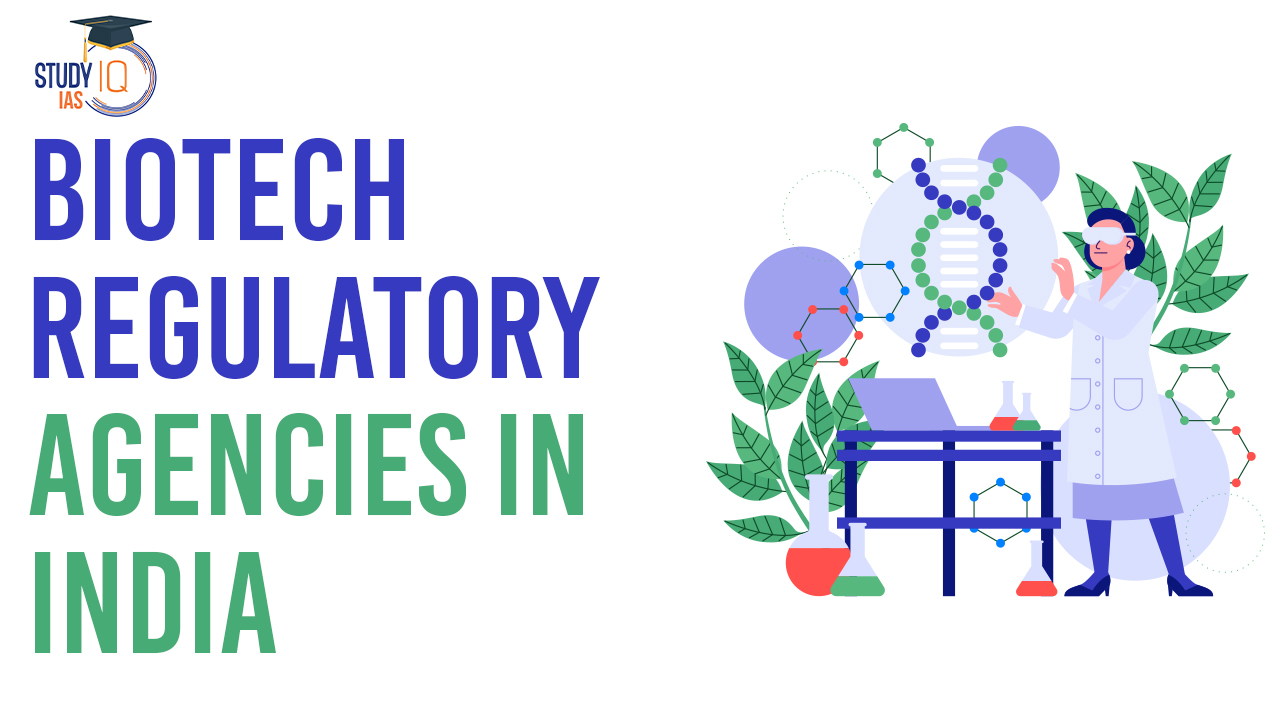Table of Contents
Biotechnology regulations in India are established to safeguard human safety, living organisms, and the environment. The proposed Biotechnology Regulatory Authority of India (BRAI) is intended to oversee biotech product applications, including GMOs, and certify their safety for use.
Currently, the Genetic Engineering Approvals Committee, under the Ministry of Environment and Forests, is responsible for approving genetically engineered products. The initial legislation addressing agrarian biotechnology in India was the 1989 Rules for the Manufacture, Usage, Import, Export, and Storage of Hazardous Microorganisms/Genetically Engineered Organisms or Cells, operating under the Environment Protection Act of 1986 (EPA).
We’re now on WhatsApp. Click to Join
Biotech Regulatory Agencies in India
In India, several regulatory agencies oversee biotechnology. The Department of Biotechnology (DBT) promotes research and development while Genetic Engineering Appraisal Committee (GEAC) assesses genetically modified organisms. The Drug Controller General of India (DCGI) monitors biopharmaceutical safety and efficacy. The Central Drugs Standard Control Organization (CDSCO) regulates biopharmaceuticals and medical devices.
The Indian Council of Medical Research (ICMR) supervises medical and healthcare biotech research. The Food Safety and Standards Authority of India (FSSAI) ensures food safety, including biotech-derived foods. The Department of Animal Husbandry, Dairying, and Fisheries (DAHD&F) oversees animal biotechnology. The Ministry of Environment, Forest and Climate Change grants environmental approvals for biotech projects. These agencies collaborate to maintain biotech products and research within national regulatory standards.
Biotechnology Regulatory Authority of India (BRAI)
The Biotechnology Regulatory Authority of India (BRAI) was established in 2013 to regulate biotechnology in India. The goal of the BRAI is to ensure that biotech products and processes are safe, effective, and ethical. The BRAI is part of the Ministry of Science and Technology.
The BRAI was proposed to ensure the protection of biodiversity from GMOs. The Genetic Engineering Approvals Committee (GEAC) is currently responsible for approving genetically engineered products. The GEAC functions as a statutory body under the Environment Protection Act 1986 of the Ministry of Environment & Forests (MoEF).
The BRAI will certify that the product developed is safe for its intended use. All other laws governing the product will continue to apply. The Food Safety and Standards Authority of India (FSSAI) is the competent authority to regulate GM foods.
Department of Biotechnology (DBT)
- Role: DBT is the primary government department responsible for promoting biotechnology research and development in India. It plays a pivotal role in formulating policies and programs related to biotechnology.
- Functions: DBT provides funding and grants for biotech research, facilitates collaboration between academic institutions, research organizations, and the industry, and monitors the ethical and safety aspects of biotech research.
Genetic Engineering Appraisal Committee (GEAC)
- Role: GEAC is a statutory body under the Ministry of Environment, Forest and Climate Change.
- Functions: GEAC evaluates and regulates the research, development, and commercial release of genetically modified organisms (GMOs) and products in India. It ensures that GMOs meet safety and environmental standards.
Drug Controller General of India (DCGI)
- Role: DCGI is under the Ministry of Health and Family Welfare and is responsible for the regulation and approval of biopharmaceuticals, vaccines, and other biotech products for human use.
- Functions: DCGI assesses the safety, efficacy, and quality of biopharmaceutical products through a rigorous regulatory process. It also oversees clinical trials of biotech products.
Central Drugs Standard Control Organization (CDSCO)
- Role: CDSCO is responsible for regulating pharmaceuticals, including biopharmaceuticals and medical devices, to ensure their safety, efficacy, and quality.
- Functions: CDSCO evaluates and approves biotech drugs and medical devices, issues guidelines, and conducts inspections to ensure compliance with regulatory standards.
Indian Council of Medical Research (ICMR)
- Role: ICMR is a premier medical research organization that plays a key role in regulating and overseeing research and clinical trials in the field of medical and healthcare research, including biotechnology.
- Functions: ICMR sets ethical guidelines and standards for research involving biotechnology in the healthcare sector. It also provides funding for medical research projects.
Food Safety and Standards Authority of India (FSSAI)
- Role: FSSAI is responsible for ensuring food safety standards in India, including those related to biotechnology-derived foods and food ingredients.
- Functions: FSSAI sets regulations and standards for biotech-derived food products, inspects food manufacturing facilities, and ensures labeling compliance for biotech-derived food items.
Department of Animal Husbandry, Dairying, and Fisheries (DAHD&F)
- Role: This department regulates aspects of animal husbandry and animal biotechnology in India.
- Functions: DAHD&F is involved in the approval and regulation of biotech products related to animal health, breeding, and production. This includes vaccines and genetic improvements.
Ministry of Environment, Forest and Climate Change
- Role: Apart from the GEAC, the Ministry of Environment, Forest and Climate Change is responsible for environmental clearances and approvals for biotechnology-related projects with potential environmental impacts.
- Functions: The ministry assesses and grants environmental approvals for biotech projects to ensure they do not harm the environment or biodiversity.
List of Biotech Regulatory Agency in India
| Regulatory Agency | Role | Functions |
| Biotechnology Regulatory Authority of India (BRAI) | Regulate biotechnology in India; Ensure safety, effectiveness, and ethics | Part of the Ministry of Science and Technology; Goal: Protect biodiversity from GMOs; Certify safety for intended use; Coexistence with other applicable laws |
| Genetic Engineering Approvals Committee (GEAC) | Approve genetically engineered products | Statutory body under the Ministry of Environment, Forest and Climate Change; Regulate GMO research, development, and commercial release; Ensure safety and environmental compliance |
| Drug Controller General of India (DCGI) | Regulate and approve biopharmaceuticals, vaccines, and biotech products | Under the Ministry of Health and Family Welfare; Assess safety, efficacy, and quality; Oversee clinical trials of biotech products |
| Central Drugs Standard Control Organization (CDSCO) | Regulate pharmaceuticals, including biopharmaceuticals and medical devices | Ensure safety, efficacy, and quality; Approve biotech drugs and medical devices; Issue guidelines; Conduct inspections |
| Indian Council of Medical Research (ICMR) | Regulate and oversee medical and healthcare biotech research | Set ethical guidelines and standards for healthcare biotech research; Provide funding for medical research projects |
| Food Safety and Standards Authority of India (FSSAI) | Ensure food safety standards, including biotech-derived foods | Set regulations and standards for biotech-derived food products; Inspect food manufacturing facilities; Ensure labeling compliance |
| Department of Animal Husbandry, Dairying, and Fisheries (DAHD&F) | Regulate animal husbandry and animal biotechnology | Approve and regulate biotech products for animal health, breeding, and production, including vaccines and genetic improvements |
| Ministry of Environment, Forest and Climate Change | Approve biotech projects with environmental impacts | Assess and grant environmental approvals for biotech projects to safeguard the environment and biodiversity |
Criticism for Biotech Regulatory Agencies in India
- Lack of transparency in decision-making processes.
- Potential conflicts of interest within regulatory bodies.
- Stringent regulations causing delays in biotech research and development.
- Inconsistent enforcement of regulatory standards.
- Complex and time-consuming approval processes.
- Lack of coordination between regulatory agencies.
- Insufficient public engagement in regulatory decisions.
- Unaddressed ethical concerns regarding biotech.
- Concerns about the environmental impact of GMOs and biotech products.
Way Forward
To address criticisms and enhance biotech regulations in India, measures should prioritize transparency, public engagement, and conflict of interest mitigation. Regulatory standards need a balanced review to streamline approval processes, encouraging innovation while ensuring safety.
Consistent enforcement and robust monitoring mechanisms are essential to enhance compliance. Improved coordination among regulatory agencies can expedite the approval process, reducing redundancy. Ethical guidelines and rigorous environmental assessments should be developed to address emerging biotech challenges.
The proposed Biotechnology Regulatory Authority of India (BRAI) can centralize and strengthen biotech regulation, certifying product safety. The role of the Food Safety and Standards Authority of India (FSSAI) in regulating GM foods must be reinforced. Regular reviews of regulations can keep them current with evolving technology and challenges. These measures collectively aim to create a balanced and effective biotech regulatory framework that fosters innovation while safeguarding public safety and addressing environmental and ethical concerns.
Biotech Regulatory Agencies in India UPSC
Biotechnology regulations in India aim to protect human safety, the environment, and living organisms. The proposed Biotechnology Regulatory Authority of India (BRAI) is set to oversee biotech products, ensuring their safety. Currently, the Genetic Engineering Approvals Committee (GEAC) under the Ministry of Environment and Forests approves genetically engineered products. Criticisms include transparency issues, potential conflicts of interest, and complex regulations causing delays.
The way forward involves enhancing transparency, streamlining regulations, consistent enforcement, and robust monitoring. Collaboration among regulatory agencies, public engagement, and ethical guidelines are essential. Implementing BRAI and reinforcing GM food regulation through FSSAI can create a balanced regulatory framework, fostering innovation while ensuring safety.


 AI and its Regulation in India, Limitati...
AI and its Regulation in India, Limitati...
 Tuberculosis (TB), Symptoms, Causes and ...
Tuberculosis (TB), Symptoms, Causes and ...
 Silicon Photonics Enables Low-power AI A...
Silicon Photonics Enables Low-power AI A...





















